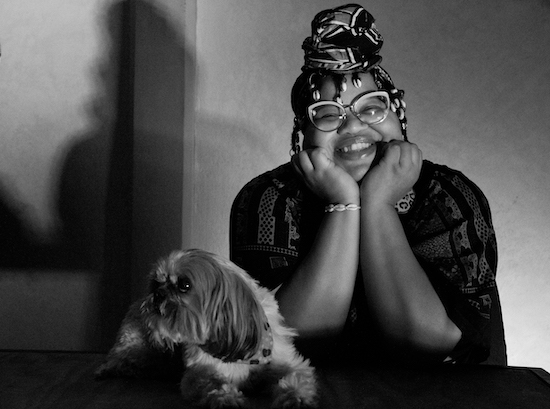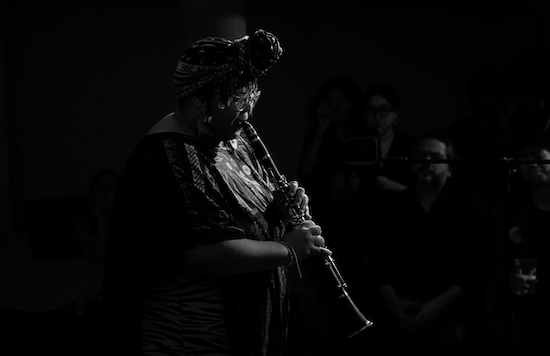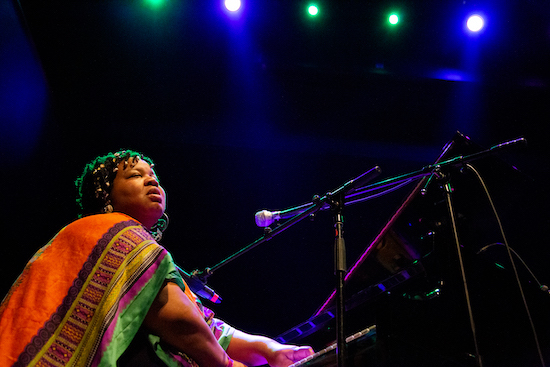I first met Chicago artist Angel Bat Dawid in October 2017 at London venue Total Refreshment Centre. I’d gone with trumpeter Emma-Jean Thackray to the Chicago x London weekend which saw musicians from both cities improvise live on stage – sessions later turned into Makaya McCraven’s Where We Come From mixtape.
Emma-Jean and I spotted Angel whilst she was playing cornet and jamming with Ben LaMar Gay to the side of the room, and we made a beeline for her once she was done. We introduced ourselves, felt the Patron Saint of kindred spirits descend, and became friends almost immediately. The next day she came onto my radio show at Worldwide FM with Ben and chatted about Chicago, running a record shop and her then-ensemble The Participatory Music Coalition.
Since then, Angel’s music has spread across the world, starting with the 100-copy release of The Oracle on cassette on International Anthem in January 2019. It quickly sold out, was repressed on vinyl, and appeared in multiple albums of the year lists last year.
Angel appears in my book Make Some Space in one of the interludes between chapters where musicians, artists and door staff tell the story from their point of view. Angel talked about TRC’s effect on her and compared it to an obscure but influential spot in South Side Chicago called Transition East. This place also provided the title for the tune she recorded for the Make Some Space audiobook. It arrived in my inbox, I played it repeatedly, and I still do. The tune is tender and powerful. Multi-tracked clarinet rises up around a time-travel drum machine which powers things forward with shades of Timmy Thomas’ ‘Why Can’t We Live Together’, a tune which was idiosyncratically popular on the acid house dance floors I inhabited as a young teenager. The tune is now being released in the US on International Anthem with a new B-side, ‘No Space Fo Us’, and a poster collaboration between New York writer Piotr Orlov and designer Jeremiah Chiu.
Both of us write about space. For Angel, this is sonic and intellectual space as Sun Ra decreed: the act of making space as necessary improvisation; the resistance of taking space where it’s refused; and highlighting space as an essential protection against the everyday harms of white supremacy. I write about space from the perspective of someone who has been around for long enough to know why it matters and who has spent the last year articulating the value of youth clubs, dank basements and autodidact venues that appear under arches, in sheds or in the back rooms of churches or restaurants.
We chatted on the phone about sound technology, the Black church and how we can all make space.
I want to quote something from your contribution to Make Some Space. You said that positive space can send out a tone to the world. What do you mean by that?
Angel Bat Dawid: I have to quote one of my favourite composers and musicians in the world: Sun Ra. He said, ‘Space is the place’. In this world with all this suffering there have to be spaces around the world that are safe havens, places of healing. Sound hospitals. We need as many of these as possible. I even extend that to my social media. I used to have this love-hate relationship with it because there’s a lot of negativity, but I realised there are people getting up every day promoting a bunch of bullshit, promoting a bunch of evil. Why aren’t we going just as hard?
And it’s the music itself, sending out a positive tone to the world…
ABD: When it comes to sound I have some theories. I believe my theories are correct, why not? The Egyptians used the power of sound to move objects. I believe that sound technology can move things. Sound is more powerful than we can imagine.
How did you end up at Transition East?
ABD: I made a leap of faith about six years ago, that I wanted to be a musician full time. During that year of quitting my job, I went to a jam session by David Boykin called Sonic Healing Ministries. There was an elder there, a multi-instrumentalist named <a href="http://www.thegreatblackmusicproject.org/elielshermanstor.html“ target="out">Eliel Sherman Storey, and he became a mentor of mine. He also owns a little place called Transition East. We were jamming, we wanted to do shows. No-one cared what we were doing, no-one was booking us for anything! So we decided to do shows at Transition East. Eliel said, ‘Sure, come through’. It’s a studio, it’s an event space, it’s just a small little place on the Southside of Chicago on a block with all Black-owned businesses. The South Side – what a tormented thing. It’s predominantly Black and there are all these great things, but it’s also known for the gang violence. Transition East is on 83rd to 88th, it’s kind of a hood area, but it’s this beautiful beacon of light.

Was this the Participatory Music Coalition?
ABD: Yes. We recorded a whole album there, it’s on SoundCloud. We did it all from our own pocket. We knew it wasn’t about popularity or getting people to come out. We needed to make some space for this music because it was changing our lives.
You manifested it…
ABD: Yes! Here it is, right under our noses. The perfect space. Then we realised that Transition East has this whole history. The original space was so significant, and so obscure.
I’ve developed a list in my head of the qualities these places have. One of those is a sense of unfinishedness, an invitation to contribute and make it yours. What were the qualities of Transition East that made it welcoming?
ABD: I think it’s the eldership. Having a supportive elder or person whose like, ‘Y’all come in, do what you want to too and I’ll support you no matter what’. Eliel really believed in us. Historically, no-one knows about the original Transition East. I found out a little bit from the George Lewis book [
A Power Stronger Than Itself: The AACM And American Experimental Music], one little paragraph where he mentions it. It’s so obscure, but so important.
When people gather together repeatedly, what does that do to a space?
ABD: The key word you said is, ‘Repetition’. Human beings, we learn by repetition. That’s how we learn to walk, that’s how we learn to talk. Repeating things dynamically changes everything. Repeating white supremacy? We gotta do something else. You see it in the Black church. It has nothing to do with religion, but the reason the Black church is really important to the Black community is because it was a space where Black folk could go and yell and scream and cry and let out all of this stuff that we have to deal with and that’s why it’s still a very important place. It’s one of the few places where a tonne of Black people can get together without a lot of… you know… stuff happening. It doesn’t have to be confined to a religious thing. It’s just something humanity needs.
I wanted to ask you about church. Was church the first place you experienced this kind of space, where culture can be generated?
ABD: Most definitely, outside of my home or my family. Having ministers as parents and grandparents and great grandparents, church is just the staple of my life. I’m not talking about utopia. There’s a lot of problems in the church too, but I’d rather be going through all the bull with my family than not with my family. I would like to go through my trials with Black people, too.
You know my song ‘Black Family’ where I say, ‘The Black family is the strongest institution in the world’. I see white folk get uncomfortable with that. What you don’t understand is that the Black family is your family. If you build the Black family up, you build yourself up. Our indigenous mothers were Black women. This is scientific! The problem is you aren’t even treating us like family. You’re treating us like Cinderella.

I saw you performing in Germany when you were inviting people to say it with you…
ABD: They wouldn’t!
I know! People were very resistant.
ABD: I was mad! I was protesting that show. Europe thinks they’re not racist, that they’re more progressive than America. Get on out of there with that! That stuff started in Europe. I was really upset that concert. You all think you’re hella progressive but you can’t even say it. The Black family needs that affirmation.
This was at a jazz festival…
ABD: Jazz is Black music, it came from Black culture. Shouldn’t be no thing to say that. Look how much Black folk went through and look what they done contributed. Think about Black people laughing or expressing joy or music. Think of how much harder that must have been for us with the oppression we had to go through. For us to still be laughing and creating, that’s a powerful thing. It should always be acknowledged.
We’re talking about space and why it matters. You lived in Kenya until you were 12 years old. What did you see there about communal gathering spaces and why they’re important?
ABD: Our house was a really great gathering place for my parents’ ministry. My dad had Bible studies, he did a play on the Book Of Revelation, all apocalyptic, and people would come over and rehearse. My dad would show films. Our house became a place for people to come. And the connection between African Americans and Africans – they were really interested in, ‘What is this type of Blackness?’, and we were interested: What is your kind of Blackness? It really became a hub. I have so many great memories of being there.
It seems like a similar vibe at your studio, which everyone knows as The Mansion…
ABD: It’s another space that has become a hub. It’s my office, but it’s more than that. It’s a place where a lot of healing has taken place. So many jam sessions. This one time Shabaka [Hutchings] and Sons Of Kemet were in town. We met up, went for dinner, then everyone was like, ‘Where can we go for a jam session?’ It was a secret jam session with Sons Of Kemet, Makaya McCraven, Junius Paul, all at mine. We had the deepest jam session ever. The fact I had a space available, for something as magical as that… I couldn’t believe it.
Can you describe it? You’re right at the top of a beautiful building in Bronzeville…
ABD: It’s the parish house of an Episcopal church, on a historical block. It’s right next door to Margaret Burrows’ mansion [Bat Dawid quotes Burrow’s poem What Shall I Tell My Children Who Are Black on her song of the same name]. Langston Hughes, Gordon Parks, Nat King Cole, Gwendolyn Brooks, all of them walked down this block. One of my friend called them up, and then three days later they gave me keys. I didn’t have to fill out anything and three years later, I’m still there. Look how progressive this little church is! I encourage a lot of churches that have space to recognise there’s a need for artists to have studio spaces.
It’s a really relevant question for faith leaders everywhere, about how they can respond to the removal of space…
ABD: Uh huh.
Tell me about the recording of ‘Transition East’.
ABD: You hit me up and I was so excited. I was just amazed because you had talked about it and all of a sudden it was a book. I was like, ‘Wow! You actually did it’. When we met, it did not exist. I was at the Mansion, I was by myself. I was ready to compose. Transition East came to my head. I started playing around which some chords, thinking about how important it was, breaking down the words: ‘Transition’ and ‘East’. AACM have a thing where they turn to the east, they turn to the sun. You’ll see Art Ensemble Of Chicago do it, Great Black Music does it. I’ve even seen [bassist] Junius Paul do it. You remember when I did the opera [Bat Dawid’s 2018 reworking of the Song Of Solomon as a cosmic love opera]? Junius stood and faced east, turning from the western viewpoint. It can go deep. Let’s face somewhere else.
That’s a whole other way of looking at ‘Transition East’.
ABD: I think that’s the call: We need to transition into some other things. This ain’t working, for nobody. It ain’t even working for the people in power. They ain’t happy. Look how miserable they are. They look horrible. When I was looking at the corona thing, looking at Trump and that doctor I was like, ‘Y’all look like you’re about to keel over and die right now. None of you look healthy. Your skin’s all weird. I don’t want your life’.
‘No Space Fo Us’ is the b-side to ‘Transition East’. The music, the intention and the title are all very powerful. Tell me about the making of it.
ABD: I got this invitation to go to Brazil on a cultural exchange. Bahia is supposed to be the Blackest part of Brazil, with so many rich and ancient African cultures. I was very happy when I got there, but then I had an incident where someone said something very upsetting to me, racially. In Bahia there’s still that dynamic of white Brazilians and Black Brazilians and the Black Brazilians are maids and cooks and the white Brazilians are very wealthy, even though they all keep the African traditions, the big festivals. Feeling that no matter where I go there’s no space for a Black person just to exist in my particular Black body, which is a healthy, wonderful Black body. There really is no space for us, so I’m going to create a space.
I was like, ‘OK I’ve got to compose something, where’s the studio?’ I had my Chicago crew, Damon Locks and Ben LaMar Gay, my Bahia crew and a bunch of South African musicians I met a few years before. We had a space all to get together and play some music.
Sometimes people say to me, ‘Oh I never went to TRC’, and they feel bad about it. I say not to worry about what you missed out because we all missed out on something…
ABD: In all honesty, breaking waves don’t last. It’s never about the physical space. Going back to Sun Ra – space is the place. Transition East wasn’t supposed to still be here. Total Refreshment as a venue had its run [the studios and rehearsal rooms are still operating]. The Velvet Lounge here in Chicago was so important, and now it’s a sports bar. We take that space with us wherever we go. If someone wasn’t at TRC, they can read your book and they’re transported there. Listen to my song and you’re in Transition East. We are the space too. We carry it with us.
Can people make their own spaces?
ABD: I encourage it. It’s not about how many people are there, it’s just creating the space, even by yourself. Sit under a tree every day and do something special. Create a space, a pocket.
Transition East is out now on International Anthem


